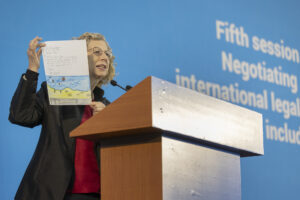
The UN Food and Agriculture Organization’s leadership team from across Africa is meeting in Accra from today to review progress and needed actions to accelerate agrifood systems transformation in Africa.
The 13th Regional Management Team meeting (RMT13) sees leaders from country, sub-regional, regional and headquarters levels come together over three days to focus on the strategic direction and practical means and processes that the Africa region has put in place to support the implementation of the FAO Strategic Framework 2022-2031.
The theme for the session is ‘Turning strategy into action: experience sharing, lessons learned and insights for resilient agrifood systems and inclusive rural transformation in Africa’. It is the first time in four years that the wider Africa team has met in person.
“This is an important moment to discuss regional priorities, share a common approach and learn from each other. A moment to build a stronger team and come together as one to address the complex challenges we face in Africa,” FAO Deputy Director-General Maria Helena Semedo said.
The FAO Strategic Framework 2022-2031 includes the Four Betters: better production, better nutrition, a better environment and a better life. The Four Betters are FAO’s strategic priority as the organization works with partners towards transforming agrifood systems to be more efficient, inclusive, resilient, and sustainable.
“It is crucial to recognize that the issues at hand are structural – most of the people in Africa are engaged in low-productivity, low-reward ventures, hence the incidence of widespread poverty, hunger, malnutrition,” FAO Assistant Director-General and Regional Representative for Africa Abebe Haile-Gabriel said in his opening remarks. “The solution lies in transforming agrifood systems into endeavours that are rewarding and investment-worthy, leaving no one behind. The key to addressing Africa’s challenges lies within agrifood systems, presenting a huge opportunity,” he said.
H.E. Ambassador Josefa Sacko, African Union Commissioner of the Department of Agriculture, Rural Development, Blue Economy and Sustainable Environment reaffirmed the AU’s solid partnership with FAO in Africa in her remarks. “We need to recommit ourselves to the fight against hunger and malnutrition in Africa,” she said, “I greatly value our collaboration at all levels.”
One FAO for the Four Betters
RMT13 is organized as African countries deal with the consequences from overlapping shocks, including the COVID-19 pandemic and the war in Ukraine that severely disrupted agrifood and trading systems. Rising food and energy prices continue to compromise household food security and nutrition, particularly for poor households who spend a higher share of their income on food and have weak capacity to cope with price increases. More than a billion people in Africa cannot afford a healthy diet.
Over the coming days, participants will share their experiences of implementing the FAO Strategic Framework and will together define upcoming opportunities to fast-track action.
Haile-Gabriel said the four priority areas of work in Africa for this biennium, which are aligned with the Four Betters, are enhancing productive capacity along agrifood value-chains; making nutritious and healthy diets affordable; promoting sustainable use of natural resources; and building resilience. The focus is on scaling up and accelerating implementation of activities under the Four Betters and FAO’s global initiatives such as the Hand-in-Hand Initiative, the Green Cities Initiative and the Digital Villages Initiative, he said.
The Regional Management Team meeting is organized annually by the FAO Regional Office for Africa and brings together the regional management team, Sub-regional Coordinators, FAO country Representatives, and senior technical experts including those from the FAO Resilience Hubs and the FAO Emergency Centre for Trans boundary Animal Diseases (ECTAD).
RMT13 comes in the lead up to the 33rd Session of the FAO Regional Conference for Africa (ARC33, 18-20 April) which will see African ministers from agriculture, fisheries, forestry and other agrifood sectors meeting with FAO to discuss country-level adoption of the Four Betters approach.








